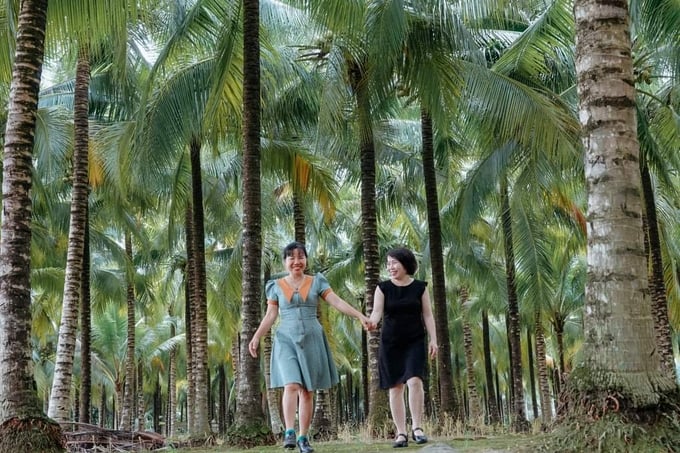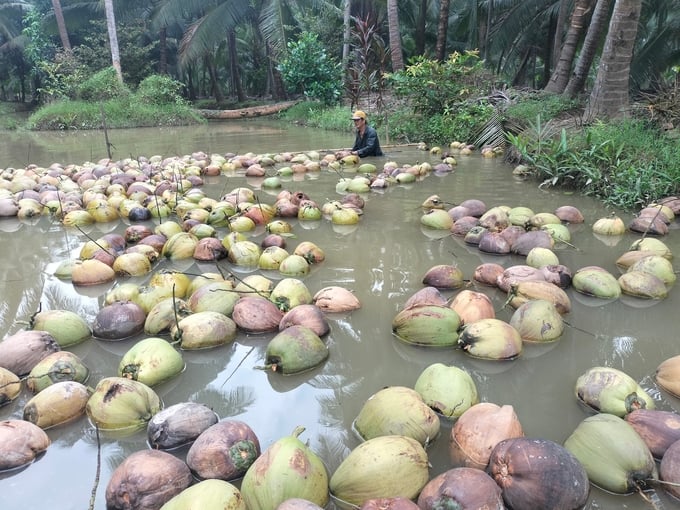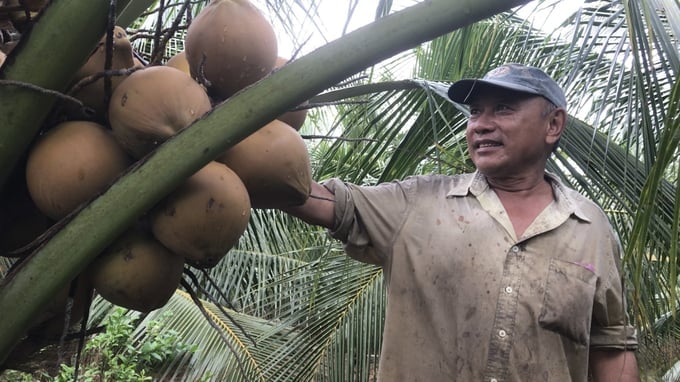May 31, 2025 | 02:34 GMT +7
May 31, 2025 | 02:34 GMT +7
Hotline: 0913.378.918
May 31, 2025 | 02:34 GMT +7
Hotline: 0913.378.918
On April 11, Vice Chairman of Ben Tre Provincial People's Committee Nguyen Minh Canh announced that the local Department of Natural Resources and Environment has been assigned to coordinate with relevant departments, sectors, and local governments in implementing the task of "Assessing Ben Tre province's potential for participation in the carbon credit market." The task will be allocated an estimated budget of approximately 4.5 billion Vietnamese dong from the environmental protection fund for the years between 2024 and 2026, on an annual allocation basis.

Ben Tre province currently houses approximately 79,000 hectares of coconut production areas. Photo: Minh Dam.
Accordingly, Ben Tre province's Department of Natural Resources and Environment will collaborate with relevant sectors to assess the carbon potential within the province's territory. Subsequently, stakeholders will determine the province's carbon credit potentials, and prepare for Ben Tre's participation in the carbon credit market, as per the roadmap outlined in the Law on Environmental Protection dated November 17, 2020.
The Department of Natural Resources and Environment will undertake several key tasks from 2024 to 2026, including: evaluating and determining the potential for reducing greenhouse gas emissions in agriculture, forestry, transportation, construction, energy, and waste sectors; researching and developing carbon credits for Ben Tre province with a focus on coconut trees, coastal mangrove forests, renewable energy, and livestock production; enhancing the capacity of local management agencies and emission sources to participate in the carbon market.
This task is aimed at implementing Decision No. 888/QD-TTg issued by the Prime Minister on July 25, 2022, which approved the Project for tasks and solutions to implement the results of the 26th United Nations Climate Change conference.
Carbon credits are certificates for commercial transactions, and represent the right to emit carbon dioxide, a greenhouse gas. One carbon credit is equivalent to 1 ton of carbon dioxide. With regards to the current trend of sustainable development and carbon emission reduction, the carbon credit market is rapidly growing as an attractive opportunity for the agricultural sector as a whole, and for the coconut production industry in Ben Tre province.

Organic coconut harvesting in Binh Dai district, Ben Tre province. Photo: Minh Dam.
Ben Tre province currently houses approximately 79,000 hectares of coconut production areas, 25,000 hectares of production areas, and 7,000 hectares of mangrove forests. These areas hold significant potential as a carbon credit supply source.
A distinctive feature of the biomass in Ben Tre province is its year-round vegetation cover and a noticeable lack of leaf shedding seasons, which contribute to its high carbon sequestration efficiency. According to estimates, one hectare of coconut production area in Ben Tre can sequester between 25 and 75 tons of carbon dioxide. With the current minimum carbon credit price at 5 US dollars per ton of carbon dioxide, Ben Tre province can potentially earn between 10 to 30 million US dollars from coconut production.
According to Associate Professor Le Anh Tuan, former Deputy Director of the Research Institute for Climate Change - Can Tho University, Ben Tre province must conduct in-depth research into the carbon storage capacity of fruit production areas across the province with the aim of developing carbon credits, and promoting the commercialization of these credits as an economic benefit.

Ben Tre province's Department of Agriculture and Rural Development requires time to conduct further research into the province's carbon credit potentials, and calculate profit-sharing models for local residents. Photo: Minh Dam.
However, Ben Tre province's Department of Agriculture and Rural Development requires time to conduct further research into the province's carbon credit potentials, and calculate profit-sharing models for local residents.
According to the Ben Tre Provincial People's Committee's action plan on sustainable development in Ben Tre province from 2021 to 2030, the local Department of Agriculture and Rural Development will develop eco-friendly agriculture, as well as promote carbon emission recycling and climate change resilience.
On the other hand, Ben Tre aims to protect, conserve, sustainably utilize and develop existing forest areas to reduce emissions; while simultaneously engage in afforestation to enhance carbon quality and storage. Futhermore, Ben Tre will proactively collaborate with experts to research into the potential value of the carbon credit market for the agricultural sector, with a focus on coconut trees and other perennial crops.
Ben Tre province will focus on implementing technical support solutions and policies to promote the development of the coconut industry, and maintain its position as the country's leading industrial crop. The province also plans to expand and establish additional concentrated fruit production areas in association with production unit codes to maintain biomass and enhance export competitiveness, thereby participating in the global trend of low-carbon emissions. Moreover, Ben Tre is determined to assist Vietnam in fulfilling the commitment to achieve net-zero emissions by 2050. To that end, the province will mobilize resources, innovate technologically, and restructure its agricultural sector.
Translated by Nguyen Hai Long

(VAN) Several scientists and farmers are experimenting with soil treatment in some key durian-growing regions such as Cai Lay (Tien Giang), Dak Song, Gia Nghia, and Dak R’lap (Dak Nong).
/2025/05/25/4127-3-073637_820.jpg)
(VAN) Thanks to the promotion from an FAO-implemented project, vegetable production in greenhouses in Moc Chau has seen strong development, from 1.5 hectares in 2021 to nearly 50 hectares in 2024.

(VAN) FAO has recently supported USD 140,000 to implement the project 'Risk mitigation human-animal interface risks through disease control initiatives in pig farming.'

(VAN) The People's Committee of Tra Vinh province has approved an adjustment to the investment policy for the Green Hydrogen Plant project, increasing its area to approximately 52.76 hectares.
![Reducing emissions from rice fields: [2] Farmers’ commitment to the soil](https://t.ex-cdn.com/nongnghiepmoitruong.vn/608w/files/news/2025/05/05/dsc08881jpg-nongnghiep-140632.jpg)
(VAN) Clean rice cultivation model in Thuong Tan commune, Bac Tan Uyen district, is assisting local residents in achieving sustainable agriculture by substantially reducing costs, increasing productivity, and protecting the environment.

(VAN) At the conference to disseminate Resolution No. 68, AgriS introduced its digital agricultural ecosystem and reaffirmed its commitment to accompanying the Government in promoting private sector development and sustainable agriculture.

(VAN) 'Blue Ocean - Blue Foods' initiative is designed to restore marine ecosystems and establish sustainable livelihoods for local communities by cultivating a minimum of 1,000 hectares of cottonii seaweed in the first three years.